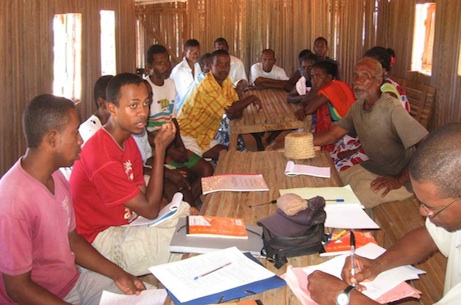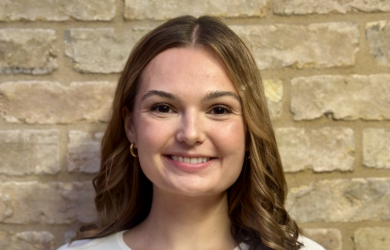
Herimanitra Patrick Rafidimanantsoa, the first Gates Cambridge Scholar from Madagascar, talks about how policymakers need to communicate better with local communities about conservation policies.
How can local communities be trained and supported effectively in conservation activities which may impact on their livelihoods?
Herimanitra Patrick Rafidimanantsoa, the first Gates Cambridge Scholar from Madagascar, says he has seen at first hand the problems created by not getting local communities on board with environmental campaigns.
He worked for two years as environmental manager of a cashew nut plantation in Madagascar, during which time he noted the disconnect between local communities and environmental diktats. “To them it looked like a bunch of rules with them being told ‘don’t do that’ or ‘there will be a fine if you do that’,” he says. “The reasons were not justified. In some situations they might need timber to build their homes, but they are just told off. The authorities don’t want to know about their hardships. Their complaints never reach anyone at the top who could change things. I think there needs to be a review of the chain of communication between local communities and policymakers.”
Patrick wants to change that and will be beginning an MPhil in Conservation Leadership in autumn.
He was born in Antananarivo, the capital of Madagascar. His parents are agronomists – his father works in the agricultural sector advising farmers on how to increase their yields while his mother is a senior manager in the field of environmental protection, advising on Madagascar’s protected areas.
His mother’s work had a particularly strong influence on Patrick as she was around more in his teenage years. “She is extremely passionate about her work. When I was 13 or 14 she was a manager in an NGO which was involved in waste management, especially used batteries and pesticides, and she would tell us about the harmful chemicals they contained. I was aware nature matters for human beings and that we needed to do something to maintain it or we would die,” he says.
His mother would get her children to sort out the rubbish into biodegradable material, papers and so forth, which was not common in Madagascar. She would also tell her children not to waste energy around the house.
At school Patrick was always the ideas person in any group. “I always liked to brainstorm ideas, review reports and present the findings to class,” he says. He went straight to University after school, applying to the School of Agronomy at the University of Antananarivo where his parents had studied because of his interest in agriculture.
Forestry
He did a five-year degree, specialising in forestry from the third year because he knew that many NGOs were looking to work in this area because of the country’s diverse vegetation. Most of the country’s forests are now protected areas. Malagasy live mostly from agriculture and have cut down many of the forests to make way for agricultural land. “The system worked well when there were only a few people in Madagascar. As the population has grown this has become an unsustainable practice with a negative impact on the country's unique biodiversity such as lemurs as well as on services provided by ecosystems that sustain lives,” says Patrick.
During his fourth and fifth years he did long field trips, exploring the protected areas in the north and south of the country and studying environmental issues.
After graduating Patrick was keen to get practical experience and got a job as an environmental manager at a large private cashew growing company called “Vergers d’Anacardes de Masiloka” (VERAMA) in the remote north western part of Madagascar in 2010. He had to learn the local dialect as part of his job involved talking to local communities about resource management.
He was given 10,000 euros from private sponsorship and had to use the money to plant a 10,000-tree forest within a four-month time scale. It was a challenging project due to the remoteness of the plantation. All the equipment for the nursery and the planting had to be imported from a nearby city and transported by dhows,. Patrick had to motivate workers, oversee the whole activity and manage the budget. The sponsor sent someone to assess the project and, due to its success, they gave a further 150,000 euros for a three-year project from 2013-2015.
Patrick left in 2012, after deciding he needed to get further qualifications to pursue his goal of becoming a policymaker. He returned to the University of Antananarivo to do a masters in forestry. During his masters he got married and his wife was then offered the chance to do a PhD in forestry at the University of Bangor. The couple moved to Wales in 2013.
Patrick had hoped to do an MBA at Bangor, but in the meantime started doing a range of jobs, from working in a supermarket and cleaning to volunteering in a forestry garden, to learn English and to understand more about the British way of life.
He also became involved in the p4ges project which investigates whether international ecosystem service payment schemes – specifically for carbon sequestration/storage and biodiversity conservation – can effectively reduce poverty in low income countries. The project focuses on Madagascar. Patrick translated its web pages into Malagasy. The leader of the project told him about the MPhil in Conservation Leadership at Cambridge where she had contacts. “I looked at the website and it matched my aspirations,” he says. He applied and was called for an interview for the Gates Cambridge Scholarship after another candidate dropped out, becoming the first Gates Cambridge Scholar from Madagascar.
Patrick hopes to go to do a PhD and return to Madagascar to work on environmental issues. “Having a masters from Cambridge is a big dream. It will make a very big difference to my ability to achieve my goals,” he says.
*Photo: Patrick meeting with local community leaders in Madagascar.
Herimanitra Patrick Rafidimanantsoa
- Alumni
- Madagascar
- 2014 Mphil Conservation Leadership
- Robinson College












